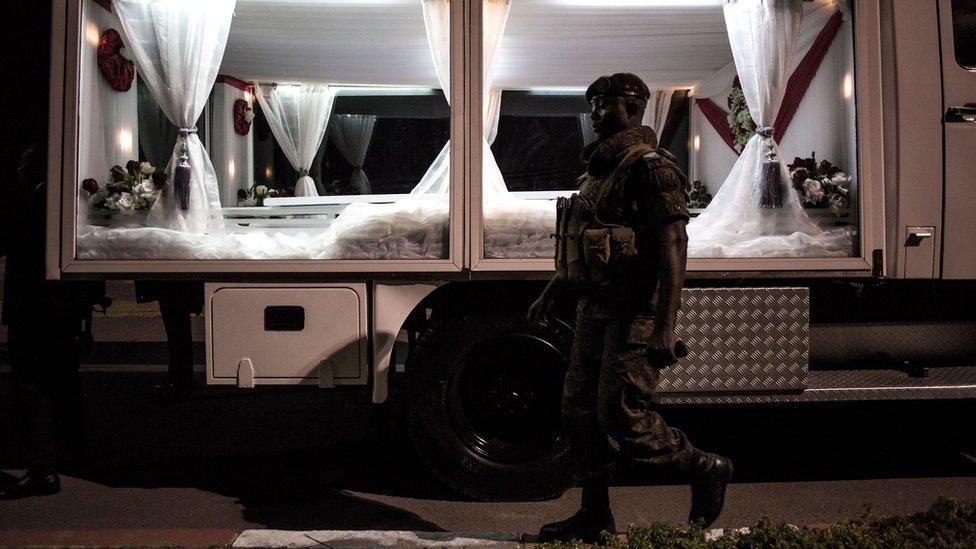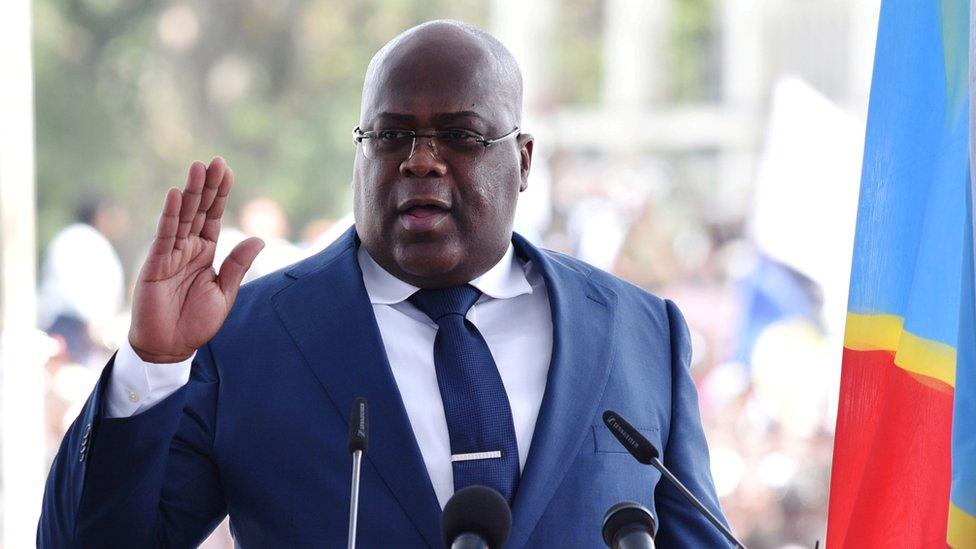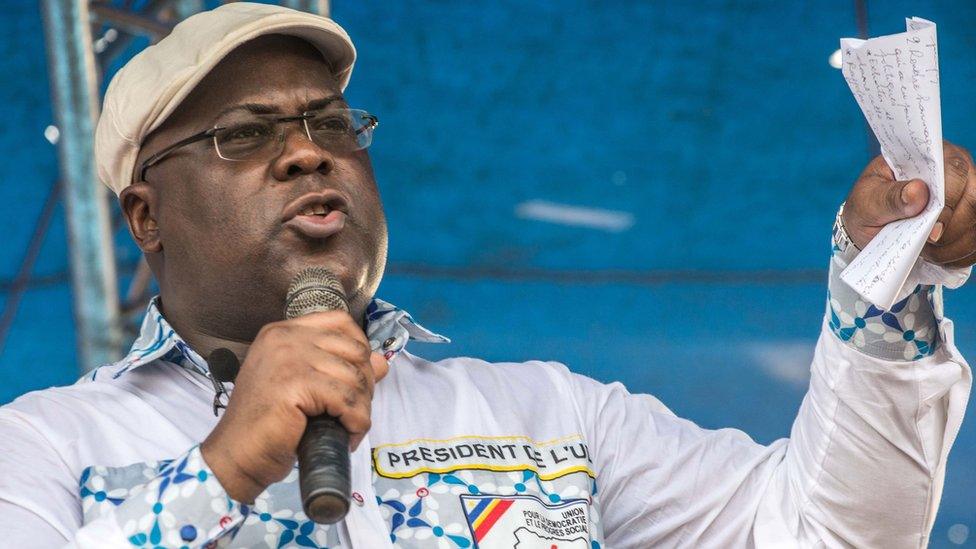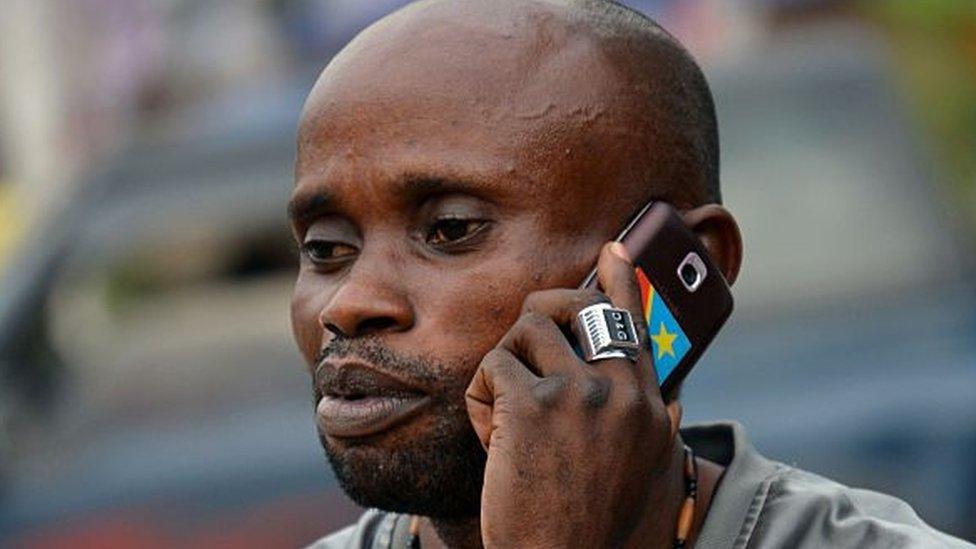Etienne Tshisekedi's body lies in state in DR Congo after two years in Belgium
- Published

Etienne Tshisekedi's casket is on public display in Kinshaa

After a two-year delay, the body of the father of Democratic Republic of Congo's president is now lying in state in his home country.
Thousands have gathered in a stadium to pay their respects to veteran opposition leader Etienne Tshisekedi.
Mr Tshisekedi died in Belgium in February 2017, aged 84, but his body stayed there because of a row with former President Joseph Kabila.
The deadlock ended when his son, Félix, became president last year.


Supporters of the veteran leader turned out in their thousands
The Martyrs' Stadium in Kinshasa erupted in cheers on Friday afternoon as the casket containing Etienne Tshisikedi's remains entered, says the BBC's Gaius Kowene.
Supporters of Etienne Tshisekedi screamed and blew whistles in the 80,000-capacity arena. The presidents of Rwanda and Angola were among the dignitaries present.

Etienne Tshisekedi was in opposition for decades but failed in several attempts to become president
A troubled journey
The campaign to bury Tshisekedi's remains in his home country faced obstacles from President Félix Tshisekedi's predecessor, Joseph Kabila.
For his supporters, Tshisekedi coming home represents a victory over the former government, our correspondent says.
Last-minute delays also hampered the body's journey from Brussels to DR Congo capital city, Kinshasa.

The coffin's journey to DR Congo has been hampered by political opposition and "organisation issues" with the plane carrying it from Belgium
Belgian news agency Belga said organisers had initially planned to rent an Airbus A330 with enough space for the coffin and 270 passengers, including veteran members of Tshisekedi's party, the Union for Democracy and Social Progress (UDPS).
A government official told AFP news agency this was cancelled due to "issues over the organisation of the flight".
A smaller private jet flew later with the body on board and 10 members of Tshisekedi's family, leaving dozens of others stranded in Belgium. The plane was reportedly lent by President Faure Gnassingbé of Togo.
Mourning begins
On Thursday evening, the plane touched down in Kinshasa airport and was greeted by a delegation led President Félix Tshisekedi.
Some supporters waited at the airport with placards bearing the slogan "Le peuple d'abord," French for "people first", when his body arrived on Thursday.
Many wore white clothes to symbolise that Tshisekedi was clean from corruption.
His body was taken away on a hearse decorated with national colours, with several thousand onlookers waiting outside the airport.
But the privately owned Actualité news site says a man was killed by a police pick-up truck as the procession drove through Kinshasa's Limete neighbourhood - a stronghold of the veteran leader.

Tshisekedi's casket will go on public display as part of several national mourning ceremonies
The schedule of mourning includes a religious service, a public display of the closed casket and a rally on Friday at the Martyrs' Stadium.
Moss Lenga, spokesperson for the Tshisekedi funeral committee, told the BBC that religious leaders would inspect the body to confirm it was Etienne Tshisekedi.

A state funeral is scheduled for Tshisekedi on Saturday
A state funeral will take place on Saturday in the town of Nsele, east of Kinshasa. Six African heads of state are expected to attend, including those of Angola, Rwanda and Congo-Brazzaville.
A life of opposition
Tshisekedi spent decades in politics but failed in several attempts to become president.
He served as interior minister in the regime of Mobutu Sese Seko, before joining the political opposition.
After serving time in prison, he founded the UDPS in 1982 and was appointed several as prime minister by Mobutu, though the two frequently clashed.
In 1997, Mobutu was ousted as leader in a rebellion led by Joseph Kabila's father, Laurent.
Tshisekedi became an opponent of the new regime, and of Joseph Kabila after Laurent Kabila was assassinated in 2001.

Tshisekedi's son Félix won a bitterly contested election last year
He boycotted DR Congo's elections in 2006, alleging vote fraud, and was beaten in a 2011 race marked by allegations of widespread voting irregularities.
Félix Tshisekedi won a bitterly contested election last year. It marked the first peaceful transition of power since DR Congo gained independence from Belgium in 1960.
However, several observer groups believe that another opposition candidate, Martin Fayulu, was the rightful winner.
Since coming to power, President Tshisekedi has agreed to work with the party of former President Joseph Kabila.
- Published24 January 2019

- Published29 December 2018
